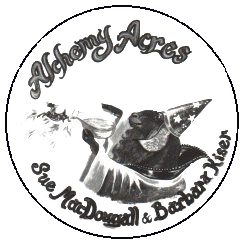Its about time for the kids to start rolling off the "assembly line" here in Tennessee. It occurred to me that it might be beneficial if we all took a moment to review our practices of pre-kidding doe management. The time and effort spent on the does prior to kidding can result in relieving stress during the actual kidding, and improve the health of the newborn kid, to boot. A few management checks or changes at this time can save dollars and time "down the road", so to speak. So here's a list that comes to mind.
Pregnant Doe Management Practices
- Vaccinations - Does should be vaccinated 3-4 weeks prior to kidding with Clostridia Perfringes C & D and with tetanus. This will stimulate the doe's immune system to produce antibodies which will concentrate in her colostrum. The kids will then have high levels of antibodies to help prevent tetanus and clostridium. This is the best and most cost effective way to protect kids against these two diseases.
- Nutrition - Does should be on an increasing plane of nutrition. Requirements for does in late gestation greatly increase as they approach kidding. Does carrying multiples require even more feed. And thin does should be separated into a smaller group to allow them to 1) eat a more concentrated ration and 2) have less competition for bunk space. Give extra vitamins at this time. Our does like the liquid Red Glo, but I'm certain there are many effective alternatives.
- Grooming - About two weeks prior to kidding, if conditions allow, shear hair off the rear and udder. This makes cleaning off the birthing fluids much easier. It also makes it much simpler to keep your milk sanitary. Care must be taken after shearing. It is important that the does have dry shelter from rain and snow. Heaven knows I sure wouldn't want my bare tail hanging out in the elements.
- Exercise - Small amounts of exercise are beneficial to the pregnant doe. This helps prevent the onset of ketosis. Does can be encouraged to exercise by feeding them in an outdoor feedlot or giving them access to a small pasture during the day.
- General Observation - Take time to observe your herd, and pick out the slow, limping and/or problem does. An ounce of prevention, and a pound of cure prior to kidding will pay big dividends.
Thats it for this month, folks. Here's hoping we all have a healthy and productive kidding season. See you all next month.
























